The document consists of 1500 words and 6 pages. emotional intelligence In order to get full access to this article, email us at sales@thedocumentco.com
Introduction
When an individual has the ability for recognition and understanding of emotions and their impact on his or her behavior, it is the emotional intelligence of this individual. People with a high degree of emotional intelligence can understand their emotions and others’ emotions as well. However, emotional intelligence is considerably different from personality traits. Some of the skills that are claimed as personality traits are emotional skills because they are built with efforts, study, and training. On the contrary, an individual born with personality traits. In business management, this skill plays a pivotal role. Leaders having emotional skills are exceptional leaders, for example, Bill Gates, Mark Zuckerberg, Mahatma Gandhi, and others.
What is Emotional Intelligence?
According to Cottrell (2015), for all kinds of relationships professional and personal, emotional intelligence is essential. There is a significant association between general mental ability and emotions. In the leadership decision-making process, emotional intelligence plays a crucial role. However, it is not essential to express our feelings all the time because unexpressed emotions are felt through displacement or disproportion. Cross and Carbery (2016) defined emotions in these words, “moods, emotions, and feelings seem interchangeable or synonymies generally, but in psychology, the case is different, according to it, affect is the stem of moods, emotions, and feelings. Affect is a broader term that consists of all the factors related to human emotional experience. Positive and negative emotions are the part of human lives and people, who are happy one moment, feel sadness on the other moment. For example, in soccer matches, when the favorite team scores they become happy, and when the opposing team scores a goal, they become angry and sad.
Emotional Intelligence and College Life
Gardiner and Barefoot (2019) stated that the journey of emotional intelligence is very difficult full of difficulties, and most people hurt themselves during the journey. The process of emotional learning starts during the college years. This is the hardest time because most of the students are inclined to enjoy, having fun, and doing more fun and less study. Having fun is not prohibited but its level and direction are important. On the contrary, some students make the most of their college years. Almost all the students have sufficient cognitive or academic skills, which are essential to perform well in the studies. Students with strong emotional skills can become an asset to an organization. In college years, students practice and develop their emotional skills, which they use in their future while working in an organization. However, non-cognitive characteristics are also important. Some of the non-cognitive characteristics are behavior, feelings, and patterns of thought. Non-cognitive characteristics help, when students are in difficulties such as the crashing of their computers and the next day they have a paper. In these difficult moments, human feelings and thoughts are changed. Similarly, within an organization, they have to face similar challenges. Under the stress of feelings, a student may give up his or her paper. Likewise, under stress, an employee can make any critical mistake while serving an organization.


Recent Comments